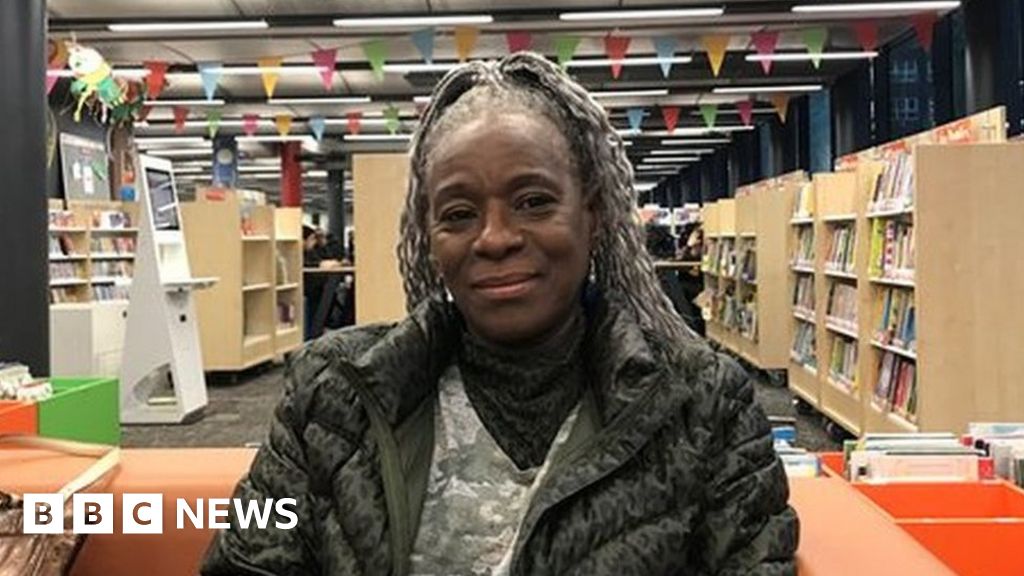Can super libraries survive spending cuts?
- BBC News
The number of services and activities on offer at Woolwich Centre Library in south-east London is a bit dizzying.
There are IT lessons, chess clubs, coffee mornings, baby rhyme times, arts and crafts, English classes and knitting groups
There are Amazon lockers where you can collect parcels, a "library of things" where you can borrow jet sprays and a pink cabinet full of free period products.
You can even borrow books.
"We basically have everything except beer on tap," says library manager Tatayana DSouza.
Five years ago, the BBC visited the library when its rise in visitors meant it was bucking the national trend.
The library has continued to be comparatively popular and last year was found to be the second busiest in the UK.
However, it is a nervous time for libraries across the country.
The local councils that fund them are under financial pressure. Past cuts to local government combined with rising prices and rising demand for services - and in some cases bad decisions- have left many facing gaps in their budgets.
Earlier this week, MPs warned that the financial crisis was "out of control" and, last November, Nottingham became the eighth council in six years to, in effect, declare bankruptcy. More are expected to follow this year.
And when grappling around to find savings, compared with cutting back on care services, libraries can look like the easier choice.
Croydon Council, which is dealing with a debt of £1.6bn, is considering shutting four of its libraries- and those in local government are warning there is more to come.
Sam Corcoran, vice-chair of the County Councils Network, says: "Councils have found it extremely hard to avoid significantly reducing their spend on libraries, culture, and tourism since 2010, with funding being prioritised towards statutory and life-critical care services.
"We know how much residents value cultural services, but the reality is that we have been unable to avoid reducing support for them."
The network has produced a report which found expenditure on libraries has fallen by a quarter (£232.5m) since 2010.
Over the past decade, a number of so-called "super libraries" have been built, often dramatic in style and providing services beyond the traditional book-loaning offer.
Mr Corcoran says councils have been forced to think "outside of the box".
"The transformation of library services to all-encompassing community hubs is a significant achievement."
James Gray, from Libraries Connected, a charity representing libraries in England, Wales and Scotland, agrees their offer has changed.
"Books and reading are always going to be central to what libraries do," he says, but he adds theres a growing recognition that "libraries are a great way of delivering different things".
"For the first few years of austerity, libraries were really good at making the best with what they had and doing more with less. In recent years, weve reached the point where further cuts are going to be felt by library users."
He says that wont necessarily mean closures. "It could be your library isnt open when you need it to be, or there arent staff to provide a full range of services, or just fewer books to borrow."
Paul Drumm, libraries partnership manager for the Greenwich borough, says the key to survival is simply getting people through the door - that involves not just providing a range of activities, but also creating a non-judgemental, tolerant atmosphere.
They offer comfy chairs and the days of the librarians signature shush are long gone.
Sometimes the teenagers can be a bit noisy, but "wed rather have them come in and be a bit hyper than not come in at all," he says.
Patrick Malone, another library staff member, says they make an effort to cater for young peoples needs - including monitoring which books are trending on TikTok and ensuring they have those in stock.
That is appreciated by teenagers Elizabeth and Rebecca, who have come to the library to borrow some books.
Both studying science at college, they say its exciting when a novel recommended online is there in their local library.
But Mr Malone says it is the non-fiction items that are really growing in popularity - the manual on passing your UK citizenship test, for example, or books on starting your own business.
Tim Coates, library consultant and former boss of Waterstones, worries libraries have lost their focus.
He thinks they have become distracted by other activities to the detriment of providing books.
That, he argues, is the reason behind low engagement in libraries, documented in surveys by the culture department.
"They have allowed the collection of books to become incredibly poor."
Woolwich Centre Library appears to be dong well - visitor numbers are up on pre-pandemic levels - but the picture across the country is unclear.
There is no central data collection system. Individual libraries gather information - on memberships, visitors and loans - in different ways and dont necessarily share them with others.
However, while there may be uncertainty about the exact impact cuts have had on library services, those in the sector seem to agree that this year will be tough.
Mr Corcoran says: "With the costs of care unlikely to abate, in the longer term we need to have a clear discussion with the next government on the extent to which councils can fund library and cultural services with the funding envelope they receive."
The government has said it recognises the challenges and last month announced a £600m support package for English councils.
A spokesperson said the Levelling Up Department remained "ready to talk to any concerned council about its financial position".